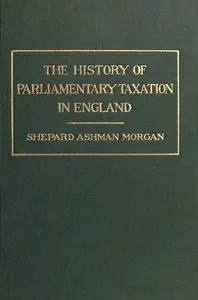"The History of Parliamentary Taxation in England" by Shepard Ashman Morgan is a historical account written in the early 20th century. This work delves into the evolution of taxation in England from the time of the Anglo-Saxons through key events such as the Norman Conquest, the establishment of Magna Carta, and the gradual shift toward parliamentary control over taxation. The book explores the changing dynamics of authority regarding tax implementation, focusing on the transition from royal edict to parliamentary approval. The opening of the text provides insights into the early concepts of taxation during the Saxon period, indicating that this system relied on voluntary contributions based on loyalty rather than imposed taxes. It highlights how the king, with the consent of assemblies like the Witenagemot, established early forms of revenue collection, including extraordinary levies like the Danegeld during foreign threats. As the narrative progresses, it suggests that taxation became a critical aspect of governance, setting the stage for the controversies and developments that ultimately contributed to the establishment of parliamentary taxation in the centuries to come. (This is an automatically generated summary.)

The History of Parliamentary Taxation in England
By Shepard Ashman Morgan
"The History of Parliamentary Taxation in England" by Shepard Ashman Morgan is a historical account written in the early 20th century. This work delve...
Genres
Released
2016-10-01
Formats
epub3 (images)
mobi (images)
epub (images)
epub
mobi
Free Download
Overview
About the Author
Information on this author is scarce, but their work continues to inspire readers.
Total Reviews
10.0k
Total reviews from Goodreads may change













